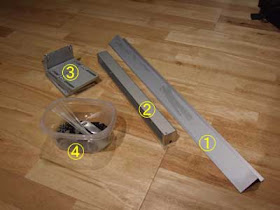Information from Mr Toshi Yoshioka, thanks for his detail explanation and photos.
All text and photo courtesy of Mr Toshi. his website :
http://yoshiokasyd.web.fc2.com/Annexes/Machine_Tools/Mill/DRO/index.htm
=============================================
I wanted DRO on my mill. The price of DRO came down recently with stronger OZ $. I found a two axis DRO priced A$325 + postage A$135 in eBay. It was much cheaper comparing to last years price. I ordered one. I thought Chinese Yuan would go up in near future and it would be good timing to buy one.
I installed the DRO referring to supplier's site.
以前より欲しかったんDROなんですが、 このところA$高もありかなり安く手に入る用になりました。eBayでフライス用の二軸DROがA$325+送料A$135で出ているのを発見。注文して しまった。この先中国元も上がるであろうし、タイミングとしてはいいんではないかと思ったわけです。
通販屋のサ イトにある取り付け例を参考にできるだけ手間をかけずに取り付けることとします。
======================================================
Brackets & Spacers
ブラケット、スペーサー
======================================================I had to think of mounting method of linear scales. I decided to use table stoppers for X-axis scale since I never used the stoppers.
リニアスケールの取り付け方法を考えねばなりません。X軸は全く 使ったことのないテーブルストッパを利用することにします。

The base had nice mounting holes (M5).
Y軸はベースにちょうどいい取り付け穴(M5)があいているんだ が、

However the accuracy of the holes was terrible and made the holes quite useless. Really I could not understand how this inaccurate machining could be done. So I decided to make new mounting holes for scale. I would mount a bracket for the sensor at arrowed place.
ネジ穴の角度が凄まじくいい加減で使い物にならんあなー。新しく取 り付け穴を開けることにしました。スケールをベースに取り付けセンサーは矢印の部分からブラケットを伸ばして取り付けることにします。

I cut out materials for brackets and spacers from t10 and t5 aluminium plates with mitre saw. It was very quick to cut them, but hot chips flew around 2 to 3 metres and cleaning up was bit cumbersome.
ブラケット、スペーサーの材料です。t5とt10のアルミ材から木 工用の丸のこで切り出し。切るのは早くて楽なんだが熱い切子が2~3mも飛び散り後の始末が面倒である。

I made holes and counter bores,
穴あけ、座ぐりをして、

And cut out by slotting saw.
すり割りフライスで切りわけ、

Steps were cut.
段差をエンドミルで削れば、

“1” is X-axis sensor bracket. “2” is Y-axis scale mounting bracket (rear). “3” is spacer for Y-axis sensor bracket. “4” is spacer for Y-axis scale (front). Arrowed holes had the same diameter as pilot hole for M5. They would be enlarged later.
こんなものができます。①はX軸センサーブラケット。②はY軸ス ケール取り付け後方ブラケット。③はY軸センサーブラケット用スペーサー。④はY軸スケール前方用スペーサー。すべてt10。矢印はM5のタップ下穴と同 径に開けてあり後で拡大。

======================================================
Installation of Y-Axis Scale
Y軸スケールの取り付け
======================================================
I made mounting holes for Y-axis scale. I attached the spacer to the base by double sided tape and drilled using a hand drill. I though angle accuracy would be kept good enough with 10mm thick spacer.
Y軸のスケール取り付けの穴をベースに開けます。スペーサーを両面 テープで張り付け、電動ドリルで穴あけ。スペーサーが10mm厚なのでそこそこの精度は出るでしょう。

When I tried to remove the spacer the paint of the base came out! The quality of the painting was very poor.
穴あけ後スペーサーを剥がしたら塗装もいっしょに剥がれてしまっ た!このような塗装が両面テープに負けるとは考えられん。シナの塗装技術恐るべし。

Cutting thread.
タップ立て。

Mounting holes for rear mounting bracket were made in the same way. The holes of the bracket were enlarged and counter bored.
後方の取り付けブラケットも同様の方法でベースにねじ穴を開け、ブ ラケットの穴を拡大、座繰りをいれて取り付けます。

Y-axis scale was temporarily installed.
Y軸スケールを仮に付けてみます。

Mounting holes for Y-axis sensor bracket were made.
Y軸センサー用の取り付け穴を開けます。

This was the material of Y-axis sensor bracket from t3 mild steel. It was impossible for me to bend this. So I asked a sheet metal works to make this.
Y軸センサー取り付けブラケットの素材です。t3の軟鋼。自分で曲 げるのは不可能なので、知り合いの鉄工所で曲げてもらいました。

Mounting holes were made.
取り付け穴を開けます。

Temporarily mounted Y-axis sensor bracket. The angle of the bracket was 30 deg.
このように30°傾いてつくわけです。

I shimmed the spacer to make the bracket parallel to the base surface.
シムをかませてベース面と平行になるように調整。

Aligning the scale. The scale was angled by 30 deg and movements of upper and side surfaces interfered each other making the alignment harder.
スケールの平行だし。30°傾いているので上面と側面の調整が相互 に影響しあい面倒であった。

Sensor position was aligned by shims.
シムでセンサーの位置を調整して固定。

======================================================
Installation of X-Axis Scale
X軸スケールの取り付け
======================================================X-axis scale would be mounted using dovetail groove of the table for stoppers, but the position of the groove was bit low. So I decided to remake the dovetail nuts, originally used to tighten stoppers, to raise the position by about 1mm.
X軸のスケールはテーブルストッパーのアリ溝を利用して取り付けま すが、アリ溝の位置が少し低すぎるのでアリ溝の中をスライドする写真の台形ナットを作りなおし、1mmほど位置を上げることにします。

I cut out and cleaned the material for the nuts, made M5 taps. The nuts had to have 10 deg slopes on both upper and lower surfaces. I cut slope in this way. I mounted small insert vice to precision vice at 10 deg. This insert vice is very handy to cut small parts in angle.
材料を切り出し、M5のねじを切り、台形の斜めの部分を10°に削 ります。こんな方法を使いました。精密バイスに超小型の精密バイスを挟んで角度を出します。小さい部品を角度を付けて削るのにはこの超小型バイスは便利で す。

Cutting a slope.
斜め切削。

Far in back is original nut and the front are new nuts.
後ろがオリジナルのナット。手前が作り直したもの。

Mounting position was raised a bit.
このように少しではあるが取り付け位置が上がる。

The scale was temporarily mounted and aligned. This case the alignment was quite easy.
スケールを取り付け、位置出し。

The mounting position of the sensor was adjusted by shims, but I could not insert the shims.
センサーの取り付け位置はシムで調整するんだが場所がきつくて入ら ん。

So I cut the shims and inserted them from sides.
シムを切って左右から入れることにした。

The sensor was firmly positioned and mounted.
センサーはこのように取り付けられています。

==================================================================
Installation of Console
コンソールの取り付け
==================================================================
The console was supposed to be mounted to the mill column, but I did not want to make mounting holes on the column. So I decided to mount it on the mill table. Then I had a trouble because the console mounting bracket was only designed to accept column mounting. So I had to make adaptors.
コンソールはフライスのコラムから腕を伸ばして取り付けることに なってますが、コラムに穴を開けたくなかったので据え付け台に取り付けることにしました。付属のブラケットが腕を水平に伸ばすことしか考慮していなく、腕 を垂直に取り付けるための変換アダプターを作りました。
I converted the direction of the mounting arm from horizontal to vertical.
アダプターを介して腕の取り付け向きを垂直に変換。
The console was mounted to mill bench.
コンソールを据え付け台に取り付けました。
Wiring around console. The cables from the sensors were quite long and looped at the back of the bench.
コンソールの配線状態。センサーからのケーブルが長く、盛大に余る のでとぐろを巻かせてあります。
The sensor cables were fixed with enough margin to allow table movement.
センサーのケーブルはテーブルの動きを阻害しないように余裕を持たせて 固定してあります。
Mounting X-axis scale on front side of the table made the cramp lever bolts too short. So I made longer cramp bolts.
X軸のクランプレバーがスケールに当たってしまうので長いボルトを 作りました。
Installed X-axis cramps with extended cramp bolts.
DRO installation finished.
Parts left over. “1” is X-scale cover. “2” is y-scale cover. “3” is sensor mounting brackets. All these parts would be good for larger mills, but too large to use on small mills. “4” is screws, shims, etc.
余った付属品。①はX軸スケールカバー。②はY軸スケールカバー。 ③はセンサー取り付けブラケット。どれも大型のフライスにはいいかもしれないけど小型のものには使用できない。④は余ったネジ、シムなど。ネジは大量に 余ったけど、必要な長さのものが無かったりした。









No comments:
Post a Comment